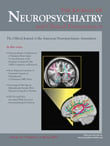Does Aripiprazole Have a Role in Treating Cognitive Impairment in Parkinson’s Disease?
SIR: Case reports of aripiprazole treating psychosis in Parkinson’s disease have been reported. 1 We present a case in which aripiprazole, an atypical antipsychotic with 5HT2A antagonist, 5HT1A partial agonist activity, improved cognitive functioning in a 57-year-old veteran with a recent diagnosis of Parkinson’s disease and depression. 2
Case Report
The patient had marked cognitive impairment confirmed by neuropsychiatric testing, indicating slowing in processing information (bradyphrenia), with learning and memory deficits. The patient presented to scheduled appointments along with a social worker because of difficulty in expressing himself. Medications comprised paxil, 20mg, and his antiparkinsons medications (sinemet and artane). He continued to do poorly in the subsequent months, with increasing episodes of confusion, depression, apathy, social isolation, and decline in working memory. Residential care was being considered. After several failed attempts in adjusting medications, the patient was started on a regimen of aripiprazole, 5 mg and increased to 15 mg, in the hopes of improving cognition. When the patient presented subsequently for his appointment, he showed marked signs of cognitive improvement. His memory, mood, verbal fluency, processing speed, alertness, and interaction dramatically improved. In the past, he was unable to drive a vehicle but since being on aripiprazole, he has been driving his vehicle with no further episodes of confusion. He continues to do well on aripiprazole.
Comment
Early cognitive impairment with five times the risk of developing dementia is noted in Parkinson’s patients due to dopamine and cholinergic deficits in the prefrontal cortex 3 , 4 with frontal and hippocampal atrophy noted in imaging studies of nondemented Parkinson’s patients. 3 Rivastigmine was shown to improve cognitive slowing in Parkinson’s disease, suggesting acetylcholine is involved in processing information speed. 3 Aripiprazole partial agonist action on 5HT1A may increase cortical acetylcholine release, improving cognition. 5 Loss of pigmented neurons in the ventral tegmental area in a small group of patients with Parkinson’s disease have been reported. 3 Systemic administration of the 5-HT2A receptor antagonist enhances activity of midbrain dopamine neurons, increasing dopamine in the prefrontal cortex. 6 , 7 5HT1A and 5HT2A receptors are located primarily on the pyramidal cortical neurons (5HT2A receptors excitatory and 5HT1A receptors inhibitory), mediating a physiological balance between excitatory and inhibitory inputs onto prefrontal pyramidal neurons. 2 Aripiprazole’s unique actions on D2 receptors possibily depend upon the cellular milieu of D2 receptors (receptor and G protein complement and concentration) eliciting agonist, antagonist, partial agonist activity, 2 which may enhance cognitive function. The most common psychiatric disturbance in Parkinson’s disease is depression with a frequency of approximately 40%, occurring usually in the early and late stages of the disease. 4 , 8 A significant correlation exists between cognitive deficits and severity of depression. 4 Depression and dementia, not motor symptoms, were associated with increased mortality in Parkinson’s disease. 2 Aripiprazole is a unique atypical which may have a role in improving mood and cognition in Parkinson’s disease.
1. Lopez-Meza E, Ruiz-Chow A, Ramirez-Bermudez J: Aripiprazole in psychosis associated with Parkinsons disease. J Neuropsychiatry Clin Neurosci 2005;17:421–422Google Scholar
2. Shapiro DA, Renock S, Arrington E: Aripiprazole a novel atypical antipsychotic drug with a unique and robust pharmacology. Neuropsychopharmocology 2003; 28:1400–1411Google Scholar
3. Ehrt U, Aarsland D: Psychiatric aspects of Parkinson’s disease. Curr Opin Psychiatry 2005; 18:335–341Google Scholar
4. Robinson RG ,Travella JI, Conwell Y, et al: Mood disorders and suicide, in Synopsis of Neuropsychiatry. Edited by Fogel BS, Schiffer RB, Rao SM. Baltimore, Lippincott Williams & Wilkins, 2000, pp 293–294Google Scholar
5. Ichikawa J, Dai J, O’Laughlin IA, et al: Atypical, but not typical antipsychotics drugs increase cortical acetyl choline release without an effect in the nucleus accumbens or atratium. Neuropsychopharmocology 2002; 26:335Google Scholar
6. Kuroki T, Meltzer H, Ichikawa J: Effects of antipsychotic drug on extracellular dopamine levels in rat medial prefrontal cortex . J Pharmacol Exp Thera 1999; 288:774–781Google Scholar
7. Ichikawa J, Li Z, Meltzer H, et al: Atypical antipsychotic drugs, quetiapine, iloperidone and melperone preferentially increase dopamine and acetylcholine release in rat medial prefrontal cortex: role of 5HT1a receptor agonism. Brain Res 2002; 956:349–357Google Scholar
8. Sano M, Marder K, Dooneief G: Basal ganglia disorders, in Synopsis of Neuropsychiatry. Edited by Fogel BS, Schiffer RB, Rao SM. Lippincott Williams & Wilkins, 2000, p 406Google Scholar



